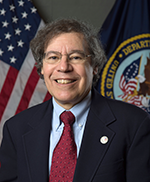
|
Qing Zeng, PhDDirector, Biomedical Informatics Center Professor, Department of Clinical Research and Leadership, GW SMHS With 20 years of experience in informatics, Dr. Zeng has special expertise in text mining, consumer health informatics, and semantic integration of data sources. She has published over 150 peer-reviewed articles, as well as served as the PI and Co-PI on a number of VA HSR&D, NIH, and DOD-funded research projects. Dr. Zeng's research vision is to leverage information for healthcare research and delivery. Her main research areas are NLP and consumer health informatics. Several of her papers have been selected by the International Medical Informatics Association's Yearbook and one paper won the Distinguished Paper Award in the 2011 American Medical Informatics Association's Joint Summit. In 2014, her "HeartsLikeMine" project won first place in the "Ideas That Work" contest at the iHealth Conference sponsored by the American Medical Informatics Association and Academy Health. Prior to coming to GW, Dr. Zeng was a Professor at the University of Utah and an Associate Professor at Harvard Medical School, where she developed an NLP tool (HITEx) for two large consortium projects (i2b2 and SPIN). HITEx was the first open-source, comprehensive clinical NLP system in the nation. In addition to her work at GW, Dr. Zeng is currently the Associate Director of the Center for Health and Aging at the Washington DC VA Medical Center. At the VA, she has organized a VA-wide collaboration to develop interoperability standards for the broader clinical NLP community. The Open Access Collaborative (OAC) Consumer Health Vocabulary (CHV) produced by her team is the first and only consumer health vocabulary that has been incorporated into the Unified Medical Language System. She has also developed a number of novel informatics methods (e.g. automated illustration of instruction and social media analysis) to improve patient-centered care. Email: zengq@gwu.edu |

|
Ali Ahmed, MD, MPHClinical Director, Biomedical Informatics Center In addition to his GW appointment, Dr. Ahmed serves as the Director of the Center for Health and Aging at the Washington DC VA Medical Center. Dr. Ahmed is a fellowship-trained geriatrician with a clinical and research interest in heart failure in older adults as well as health and outcomes of older adults with multiple chronic conditions. His research focuses on quality and outcomes of care in these patient populations using epidemiological methodologies, including propensity score matching. Prior to his move to Washington, Dr. Ahmed was a Professor of Medicine and Epidemiology at the University of Alabama, Birmingham and the founding Director of the Geriatric Health Failure Clinic at the VA Medical Center in Birmingham. |

|
Marc Blackman, MDProfessor of Medicine, GW SMHS Dr. Blackman has appointments at George Washington University, Georgetown University, Johns Hopkins University, and University of Maryland Medical Centers. He also serves as the Associate Chief of Staff for Research & Development in Washington DC VA Medical Center, where he facilitates various clinical, translational and laboratory based research and research training programs within the Medical Center, and with the VA’s academic partners. His research interests are in neuroendocrinology, reproductive endocrinology, and gerontology/geriatrics. |

|
Yan Cheng, PhDAssistant Research Professor Yan earned her M.S. in Pharmacoeconomics, Epidemiology, Pharmaceutical Policy and Outcomes Research from the University of New Mexico in 2011 and PhD in Pharmacotherapy Outcomes Research from the University of Utah in 2017. She received the Technology-Oriented Comparative Effective Research Scholar Award from the University of Utah in 2013. In the same year, she was appointed as the WOC research staff at the VA Salt Lake City Health Care System. Since then, she has been involved in the projects of addressing health and healthcare disparities in osteoporosis and HIV/AIDS among the VA populations. Her two first-author posters based on these projects won the Finalist Poster Award at the 20th Annual International Meeting of ISPOR in 2015. Currently, she works on NIH- and Pharma-funded projects related to frailty and mental illness. Her primary areas of expertise are pharmacoepidemiology, comparative effectiveness research, and SQL and SAS programming. Her specific research interest is to address health disparities in aging populations. Email: yan_cheng@gwu.edu |

|
Stephen ChuaData Analyst |

|
Alexandra DaceyResearch Program Associate Alexandra received her M.S. in Biomedical Informatics from The George Washington University in 2023. She earned her B.S. in Healthcare Administration with a concentration in Health Systems Management from George Mason University in 2019. Alexandra has a background in finance/accounting and project management. Her research interests are in health disparities, and mental health and addiction. Email: adacey@gwu.edu |

|
Guy DivitaResearch Affiliate In addition to his work with the GW Biomedical Informatics Center, Mr. Divita is associated with the University of Utah’s Medical School and the Salt Lake City VA Health Sciences R&D division as an NLP evangelist by day, and research associate by title. Known to a few as the wise guy, he is known for naming his tools after favorite characters, including “Sophia: an expedient information extraction tool”, “Nora, a vocabulary building tool”, his current professional interests include document sectionizing, template identification, synthetic document creation, vocabulary curation, and building NLP tools for clinician’s use. Prior to his association with the VA and the University of Utah, Mr. Divita has had the honor and privilege to work at the National Library of Medicine’s Lister Hill Center for Biomedical Communications for 16 years. He aided the creation of well-known tools and resources such as the UMLS, the SPECIALIST Lexicon, MetaMap, MMTx, LVG, and long-forgotten tools like gspell. Mr. Divita holds a bachelor’s degree in Statistics from The George Washington University and a master’s degree in Computer Science from George Mason University. |

|
Joseph Goulet, PhDAdjunct Professor, Department of Medicine, GW SMHS Dr. Goulet is an Adjunct Professor at the George Washington University School of Medicine, and Assistant Professor of Psychiatry at Yale School of Medicine, and is currently the Director of Biostatistics for: 1) Veterans Aging Cohort Study, an NIAAA funded multi-site prospective cohort study examining the role of alcohol use and abuse in determining outcomes among veterans aging with HIV infection and comparing this role to age-race-site matched HIV negative veterans, and 2) the VHA funded Pain Research, Informatics, Medical comorbidities and Education study (PRIME), a project to promote access, continuity, and sustainability of safe and effective interventions for pain and pain-related disability for veterans. Dr. Goulet conducts research focusing on the process of care and outcomes related to HIV infection, including the effects of aging, medical treatment and adherence, provider characteristics, and psychiatric comorbid illness. |

|
Peter Kokkinos, PhDAdjunct Professor, Department of Clinical Research and Leadership, GW SMHS Dr. Kokkinos is currently the Director, CRC-Human Performance Research and Lifestyle Interventions for Veterans (LIVE) at the Veteran Affairs Medical Center in Washington, DC and has previously held faculty positions at Georgetown University School of Medicine, George Washington University School of Medicine and Health Sciences, and the University of Maryland School of Public Health. His research interests include assessing cardiovascular risk and overall mortality, with some of his previous studies focusing on the impact of exercise on various conditions such as chronic kidney disease, hypertension, diabetes, dyslipidemia, and obesity. The findings of his work have been published in prestigious journals such as the New England Journal of Medicine, Circulation, Diabetes Care, and Hypertension. |

|
Adnan Lakdawala, MDPostdoctoral Associate |

|
Youxuan (Tony) LingBiostatistician |

|
Phillip Ma, MDAssistant Research Professor Phillip earned his B.A. in Biology and Economics from Rutgers University before earning an M.D. in 2019 from the American University of Integrative Sciences. While earning his medical degree, he served as an assistant in the Pharmacology department. Phillip leverages his clinical training and burgeoning interest in Python, Machine Learning, and SQL as a resource to the Biomedical Informatics Center. His primary interests include utilizing social media data in informatics research and addressing mental illness/wellness in underserved communities. Email: phillipma@gwu.edu |

|
Seyedeh Azadeh MiranData Analyst Azadeh earned her M.S. in Engineering from the University of Akron, OH in 2016, where she received a graduate assistantship award for her study and worked on two funded projects related to statistical modeling and reliability analysis. She earned her B.S. in Industrial Engineering from Alzahra University in Iran. Afterward, she worked as a Data Engineer and Data Management & Quality Expert for several years. Her expertise is in Python, MATLAB, R programming, and statistical software (e.g. Minitab, JMP, SPSS). She joined the Biomedical Informatics Center as a Data Analyst to collaborate with and help clinical experts achieve their goals by extracting analytic insights and clinical outcomes of different patient cohorts from big healthcare data sets. Email: samiran@gwu.edu |

|
Neil Mittal, MD, PhDPost-Doctoral Researcher Dr. Mittal received his Ph.D. in Biomedical Engineering from the College of Engineering at Virginia Commonwealth University in 2021. In 2023, he joined George Washington University's Biomedical Informatics Center as a Post-Doctoral Researcher. He has a broad background in translational research, across clinical medicine, engineering design, computational modeling, and statistical analysis, with a long-term focus on improving the options for patient care and medical practice. His current project, Representational Semantic Integrity, seeks to improve accuracy and consistency in diagnosis and record keeping as terminologies and diagnosis codes change over time, to reduce error in large data analysis of patient records. The use of automated methods can reduce mismatches and errors in diagnosis coding by employing machine learning techniques on large volume electronic health record data for prediction and characterization. Email: neil.mittal@gwu.edu |

|
Stuart Nelson, MD, FACP, FACMIClinical Professor, Department of Clinical Research and Leadership, GW SMHS Dr. Nelson is a Fellow of the American College of Physicians and a Fellow of the American College of Medical Informatics. After considerable experience in academic medicine with a research focus in medical informatics, Stuart transitioned from medicine to full-time medical informatics. He worked as a consultant to the National Library of Medicine on the Unified Medical Language System (UMLS) project from 1988 until 1996. From 1996 to 2012, he served as the Head of Medical Subject Headings at the National Library of Medicine, National Institutes of Health. In addition to his work on MeSH, he conceived and developed RxNorm, a structured vocabulary of medication names, and, with the cooperation of the FDA, DailyMed, the official site for publishing the product labels of medications in the United States. While at the NIH, Stuart received the NLM Board of Regents award for Scholarship and Technical Achievement and an NIH Award of Merit. He has numerous publications and presentations. Email: stunelson@gwu.edu |

|
Yijun Shao, PhDAssociate Director of Data Science, Biomedical Informatics Center Dr. Shao earned his PhD in mathematics from the University of Arizona in 2010 and a graduate certificate in Biomedical Informatics from the University of Utah in 2015. He received Daniel Bartlett Fellowship in 2009 and an Outstanding Research Fellowship in 2010 from the Department of Mathematics, University of Arizona. In 2016, a paper he presented at the AMIA Annual Symposium won the Distinguished Paper Award. His main interest is to apply mathematical knowledge and skills to solving medical informatics problems. He has developed several new methods for informatics tasks including ICD-based topic modeling and stable topic extraction, which were applied to a number of projects funded by VA, NIH, and PCORI. Email: yshao@gwu.edu |

|
Helen Sheriff, MDAdjunct Professor |

|
Senait Tekle, PhDPost-Doctoral Research Fellow Senait is pursuing her post-doctoral training through the George Washington University (GW) Primary Care Research Program (P-CART). The P-CART program is a federally funded Ruth L. Kirschstein National Research Service Award administered by the US Health Resources & Services Administration (HRSA). Senait earned her M.A. in International Business Management from the University of Westminster in London before earning her M.S. and PhD in Prevention Science from Washington State University. She has a background in study design, implementation, evaluation, and dissemination of health promotion and disease prevention. Current projects include 1) testing the effect of AI model explanations on trust and bias detection and 2) examining the long-term change in mobility among older adults and the interplay between race and other demographic characteristics. Email: stekle@gwu.edu |

|
T. Elizabeth Workman, PhDAssociate Research Professor Dr. Workman’s research interests primarily address how people obtain, process, and communicate biomedical information, and how discoveries in these areas can lead to improved patient outcomes. She received a Master's degree in Information and Library Studies from the University of Hawaii and a PhD in Biomedical Informatics from the University of Utah, where she developed a novel algorithm that adaptively summarizes abstracts from the biomedical literature. Her postdoctoral work at the National Library of Medicine addressed several research areas, including information seeking behavior, automated knowledge discovery, data visualization, retrieval algorithms, and the semantic analysis of text. Dr. Workman received the Bruce A. Houtchens Award in Medical Informatics and Telemedicine in 2011 from the University of Utah School of Medicine, for best paper of the year in biomedical Informatics, health informatics, or telemedicine. She is a member of Phi Kappa Phi, Golden Key, and Beta Phi Mu Honor Societies. Dr. Workman’s current research includes applying methods in natural language processing (NLP) and machine learning to clinical text. She has developed novel methodologies to identify risk factors of disease, improve surveillance systems, understand temporal processes in disease pathologies, identify and extract symptoms, improve NLP tools, and increase insight into healthcare communications and processes. Email: lizworkman@gwu.edu |

|
Ryan WuBiostatistician Ryan earned his M.S. in Statistics and Data Science from the University of Nevada, Reno in 2021, where he received multiple awards and scholarships for his exceptional academic performance and research. Following his graduation, Ryan worked with the Center for Biostatistics in AIDS Research in the Harvard School of Public Health on HIV/AIDS, Tuberculosis, and COVID-19 clinical studies prior to joining GW's Biomedical Informatics Center. He primarily works with the Biostatistics Services team, which assists all GW departments with requested statistical analyses, but also supports the Center's grant-funded research projects with his expertise in statistical methods and programming in R and SAS. His skills and interests extend to utilizing Survival Analysis, Predictive Modeling, and Statistical Learning methods to identify trends and associations within health data. Email: ryan.wu@gwu.edu |

|
Ying Yin, PhDAssistant Research Professor Dr. Yin received her Pharmacology Ph.D. from the School of Medicine, Temple University, in 2013. After graduation, she spent 7 years as an excellent consultant specializing in data analysis and data visualization, serving clients in diverse industries. In 2020, she joined GWU as a post-doctoral researcher. Her background in biomedical science and applied experience in data management and data analytics prepared her to solve medical informatics problems in a real-world setting. By collaborating with the clinical experts, her research focuses on leveraging the big data sets available through electronic health records and performing retrospective and/or predictive studies using machine learning and statistical methods to summarize, compare, and predict clinic outcomes of different patient cohorts. Email: yiny@gwu.edu |

|
Edward Zamrini, MDAdjunct Professor, Department of Clinical Research and Leadership, GW SMHS |

|
Linda Zanin, EdDAdjunct Professor, Department of Clinical Research and Leadership, GW SMHS With 32 years in higher education and building community partnerships, Dr. Zanin currently serves as the Director of Strategic Partnerships. In her role, she connects and supports academics, researchers, and community members to facilitate, grow, and strengthen community-engaged research. Dr. Zanin supports community–academic Email: lzanin@gwu.edu |